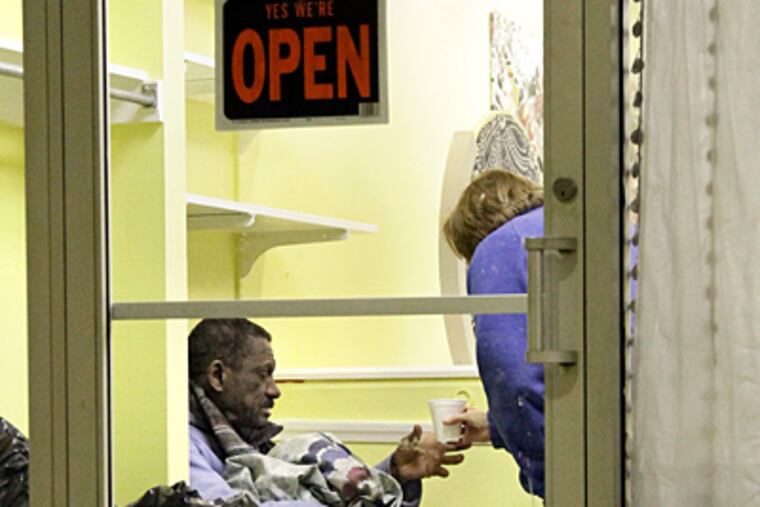In Suburban Station, lost souls get some direction
As outbound trains whisked commuters home at the end of a workday last week, dozens of others around the waiting area and hallways of Suburban Station had no plans to leave.

As outbound trains whisked commuters home at the end of a workday last week, dozens of others around the waiting area and hallways of Suburban Station had no plans to leave.
An elderly Ukrainian man who spoke only broken English fished through a trash can, found a half-filled McDonald's cup, and took a sip.
Another man who said he was from Cuba shuffled from one end of the station to the other, clutching a dirty blanket.
A young man shouting with slurred speech sat at the top of the steps leading to a platform.
They are known as "long stayers" - the homeless who have been sleeping at night in the Suburban Station concourse for months, sometimes years. Many suffer from mental illness, addictions, or both. And as the temperature drops, their numbers grow.
Persuading them to seek help is a constant challenge and the city and social service agencies are making a concerted effort this winter to reach out to them.
An empty hair salon in Suburban Station has been converted into the "Hub of Hope." It brings together in one place health-care providers and representatives of groups that provide help to the homeless and mentally ill.
"If we have this significant population in the concourse, then we should target significant resources in the concourse," said Marcella Maguire, head of homeless services for the city Department of Behavioral Health.
Last week, when the city conducted its quarterly count of homeless people on the streets, 188 individuals were sleeping in Suburban Station and the underground hallways around City Hall and the Broad Street subway line. That represented about half of the total street count in Center City.
Project H.O.M.E. and the Mental Health Association of Southeastern Pennsylvania staff the storefront in Suburban Station from 7 to 10 p.m. nightly.
Cubicles where hair stylists used to work now have desks.
Last Wednesday night, a trickle of homeless people came in. Some were curious. Some just wanted a free cup of coffee. Some needed medical attention and were directed to a back room where a nurse, nurse practitioner, and psychologist were stationed.
The medical team - volunteers from hospitals as well as the nonprofit Public Health Management Corp. - was available to treat basic medical problems like blistered feet, as well as to conduct psychological evaluations.
The Hub, funded with private and public money, will stay open until April.
"It's not going to be a quick fix or turnaround," said Sister Mary Scullion, cofounder of Project H.O.M.E., a nonprofit provider of services and housing for the homeless. "But if we're there a few months, we'll be able to see the impact."
So far, the teams have connected with 167 people. Thirty-seven have gone to shelters or other residences. Four entered detoxification programs; three connected with a mental-health crisis center; and one entered a hospital.
Johnathan Evans, of the Mental Health Association, coordinates outreach for the Hub. Two-person teams descend into the concourse every night to try to persuade people to come into the office.
Twenty years ago, Evans was homeless and addicted. He said he knows what it's like to sleep next to a Dumpster in an alley. Most of the outreach workers are like him, and, he said, can relate on a deeper level to the people they're trying to help.
Evans said many people who have been out on the streets for a long time "can't navigate the system. They become overwhelmed."
He said they often have medical or psychiatric issues that have gone untreated.
Earlier that night, Evans helped a man fill out a three-page form for mental-health services.
Later, he combed the halls of Suburban Station, looking for a woman with bad asthma who had come into the Hub the night before.
She had agreed to come off the streets. But as Evans walked from one end of Suburban Station to the other, she was nowhere to be found.
Evans wasn't giving up. He would look for her again - and maybe she would look for him. "The word of mouth down here is phenomenal," Evans said.
If people come into the Hub seeking shelter, Project H.O.M.E. has about a dozen available beds at residences for women. A temporary shelter operated by local college students at the Arch Street United Methodist Church can accommodate 30 men.
On Wednesday night, when the temperature dipped into the 30s, Tarrell Darby was one of the people who agreed to leave Suburban Station. He said he had been sleeping there since June.
As he walked to the church shelter with one of the outreach workers from the Hub, he said, "I want to go somewhere. It's cold."
To see the homeless situation at Suburban Station, go to www.philly.com/hubofhope.EndText